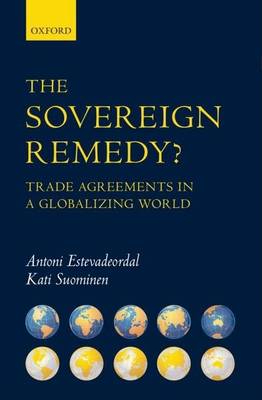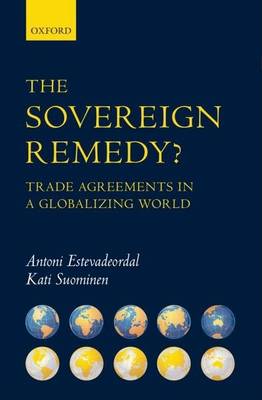
- Afhalen na 1 uur in een winkel met voorraad
- Gratis thuislevering in België vanaf € 30
- Ruim aanbod met 7 miljoen producten
- Afhalen na 1 uur in een winkel met voorraad
- Gratis thuislevering in België vanaf € 30
- Ruim aanbod met 7 miljoen producten
Zoeken
The Sovereign Remedy?
Trade Agreements in a Globalizing World
Antoni Estevadeordal, Kati Suominen
Hardcover | Engels
€ 171,95
+ 343 punten
Omschrijving
International trade and the rapidly proliferating network of trade agreements have aroused passions for decades. While some blame trade agreements for exporting jobs, sowing poverty, furthering illegal migration, and robbing national sovereignty, others praise them as lynchpins of growth, pillars of peace, guarantors of security, and engines of globalization. Still others view them as useful instruments for fostering global trade and investment. This book examines whether trade agreements merit the blame levelled against them or the hopes pinned on them. It employs extensive new historical data on trade agreements to examine the features of the ongoing trade agreement wave; analyzes the future implications of trade agreements in the context of the multilateral trading system, world trade, and international politics; and puts forth novel policy proposals to make trade agreements a more constructive force in the global economy.
Specificaties
Betrokkenen
- Auteur(s):
- Uitgeverij:
Inhoud
- Aantal bladzijden:
- 288
- Taal:
- Engels
Eigenschappen
- Productcode (EAN):
- 9780199550159
- Verschijningsdatum:
- 15/06/2009
- Uitvoering:
- Hardcover
- Formaat:
- Genaaid
- Afmetingen:
- 236 mm x 160 mm
- Gewicht:
- 632 g

Alleen bij Standaard Boekhandel
+ 343 punten op je klantenkaart van Standaard Boekhandel
Beoordelingen
We publiceren alleen reviews die voldoen aan de voorwaarden voor reviews. Bekijk onze voorwaarden voor reviews.











